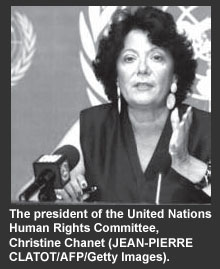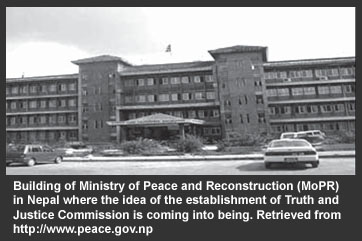In a landmark decision passed on 28 October 2008, the UN Human Rights
Committee (HRC) has directed the Government of Nepal to thoroughly
investigate the incommunicado detention and subsequent disappearance of
Surya Prasad Sharma, a resident of Kalika VDC-7, Baglung District, by army
personnel after his arrest on 14 January 2002.
 The HRC,
an independent body of experts, also directed the government to provide an
“effective and enforceable remedy” and report to it the measures it has
taken within 180 days.
The HRC,
an independent body of experts, also directed the government to provide an
“effective and enforceable remedy” and report to it the measures it has
taken within 180 days.
Coincidentally, the decision has come around the same
time as the Peace and Reconstruction Ministry has made public the draft
bill for the formation of a Commission of Inquiry on Disappearance. In
this context, the decision, which equates disappearances to multiple human
rights violations, will sensitize the government about the enormity of the
act of disappearance and, in turn, will further underscore the need for
the draft bill on disappearance to comply with international human rights
instruments. Moreover, the decision, which is a milestone in the annals of
Nepalese judicial history, can be taken as a precedent to all other cases
of disappearance.
The HRC, in its decision, has outlined violations of
Article 2(3) (the right to an effective remedy), Article 7 (the right not
to be tortured), 9 (the right to liberty and security of person) and 10
(respect for the inherent dignity of a human person) of the International
Covenant on Civil and Political Rights (ICCPR).
“In accordance with article 2, paragraph 3, of the
Covenant, the State party is under an obligation to provide the author
[meaning the complainant, i.e. the victim’s wife Yashoda Sharma] with an
effective remedy, including a thorough and effective investigation into
the disappearance and fate of the author’s husband, his immediate release
if he is still alive, adequate information resulting from its
investigation, and adequate compensation for the author and her family for
the violations suffered by the author’s husband and themselves”, the text
of the landmark decision reads.
The case, which was submitted by Yashoda Sharma on 26
April 2006, had, as per the HRC procedures, gone through admissibility and
merit tests before the final decision was made. Yashoda Sharma was
represented by Advocacy Forum.
The victim was summarily arrested by a group of
uniformed army personnel numbering 10-15 from Kalidal Gulma, Baglung, at
around 5 a.m. in the morning of 14 January 2002 from his home. His
whereabouts remained unknown after that. On 4 February 2003, Yashoda
Sharma filed a writ petition of habeas corpus but the Supreme
Court, in its verdict passed on 16 February 2005, quashed the petition
believing the information provided by the civil and military authorities
that the victim died as a result of drowning in the river after he had
jumped into it while trying to escape at the time he was taken to identify
a Maoist hideout and that therefore “he was not in the custody or control
of the state.” As all existing legal provisions of Nepal were exhausted,
Ms. Sharma had decided to submit the case to the HRC.
Besides being a momentous decision in terms of
recognizing the rights of the disappeared person, the decision has also
acknowledged the travails of Yashoda Sharma in terms of the torture
inflicted on her by the State. In this context, the decision is also
significant as it points to the need to reform a host of national laws,
including the Torture Compensation Act 1996.
The decision has come as a ray of hope to all the
victims of human rights violations in general and the victims of
disappearance in particular. Furthermore, the decision also proves
instrumental in fighting the pervasive climate of impunity in the country
because it clearly affirms the state’s obligation to “not only conduct
thorough investigations into alleged violations of human rights,
particularly disappearances and acts of torture, but also to prosecute,
try and punish those held responsible for such violations.”

 The HRC,
an independent body of experts, also directed the government to provide an
“effective and enforceable remedy” and report to it the measures it has
taken within 180 days.
The HRC,
an independent body of experts, also directed the government to provide an
“effective and enforceable remedy” and report to it the measures it has
taken within 180 days.